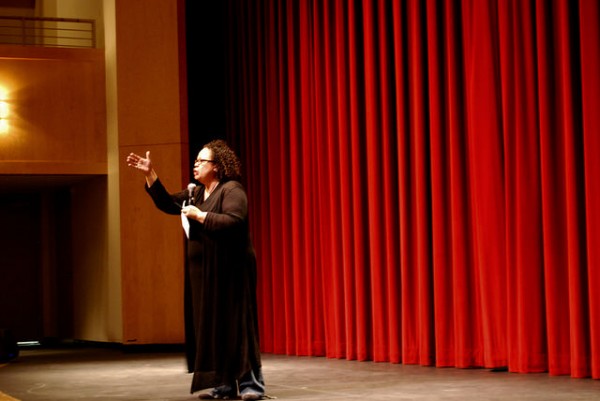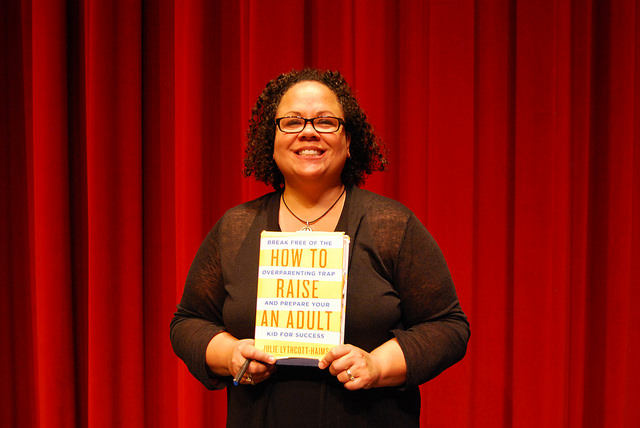Amy Liu ('17) is a senior. This is her fourth year on the Review.
Speaker laments helicopter parenting, “checklist childhood”
January 19, 2016
Author Julie Lythcott-Haims is on a crusade to save parents and students from themselves. Modern-day parents and students have adopted a success-driven checklist that robs students of their childhood, she told a packed assembly of upper school students on Jan. 11.
“You need to go the the best high school in the city,” Lythcott-Haims said. “But that’s not it, you also have to get the highest standardized test scores. And that’s not it. You have to do activities, sports, leadership and community service. Don’t just join a club, start a club.”
Student-parent relationships
Lythcott-Haims’s ideas are rooted in her experience as a former Dean of Freshmen at Stanford University, where she often witnessed stressed-out parents exerting control over students’ academics, extracurriculars and career choices. During the assembly, Lythcott-Haims discussed over-parenting in college decisions, a topic she has written about in her book “How to Raise an Adult” and has discussed in numerous TED Talks.
“I like that she advised parents to be more hands-off and give their children more room. Doing that can be a good thing,” senior Daniel Shebib said.
Lythcott-Haims is also a mother of two high school students. She realized that she had become the type of parent she criticized. A turning point was watching her sophomore son struggle with a heavy course load that seemed necessary for his competitive edge. Abandoning her inner helicopter mom, she encouraged him to drop a class and speak to the Dean himself about why he should drop the class.
“I told him, ‘I would love for you to get into these great colleges and be successful. But what we love more than any of that is you’,” Lythcott-Haims said, choking up onstage. “Now, all those colleges may not want him anymore because he dropped this class. But guess what? I don’t care.”
Many students saw her son’s story as all too familiar.
“I struggled a lot too my sophomore year, so I related to her son. One of the qualities I had to learn was just saying no. I have a lot of interests, but I can’t kill myself by pursuing too much,” junior Annie Ren said.
Instead of imparting secrets on how to get the highest test scores or participate in the most attractive extracurricular acivities, Lythcott-Haims offered up one simple rule: “Be kind.”
“This message was unique. We’re normally told to do our best and be as competitive as possible, but we usually don’t hear ‘Be kind’ in the context of a college search process,” junior Aileen Zhang said.
Some students had mixed feelings about the assembly. Some thought that her message, although moving, would have little impact.
“I agree with what she said, but it might be too little too late. Nothing is going to change,” junior Ethan Wang said. “Pressure from parents and peers is already very entrenched in school culture.”
But fans of the speech suggest that the school should take greater action in order to implement her ideas.
“If we really took her message to heart, then we wouldn’t just let her come and give a talk. The school could try to make an internal change first,” junior Matthew Fastow said. “The parents who need to hear this message usually don’t think they’re the ones doing this.”
Lythcott-Haims presents her book, “How to Raise an Adult.”
The “brand-name” craze
The frantic pace required to get into the few elite colleges has become increasingly fast.
“Parents are expecting all of these things, but we never had to meet these standards when we were children,” Lythcott-Haims said.
Lythcott-Haims addressed the unreasonable obsession with “brand-name” schools. She asked students to consider other colleges and universities besides those on the top of rankings lists, such as U.S. News and World Report.
“At least some of the top five percent of universities should have consideration,” she said “That is over 100, and there are thousands of others with great education and faculty. Why are we always looking at the same 25?”
English teacher Clay Guinn (‘92) also encourages students to consider myriad options.
“I wouldn’t say that this college culture is all negative. A big reason why students are here is to get into good colleges,” Guinn said. “Students could expand the definition of what a good college is, achieving in different ways and not putting everything in the same box.”
Students often place too much emphasis on college admittance as an entire evaluation of themselves, which can be a dangerous mindset for those pursuing colleges that admit under ten percent of their applicants.
“If you don’t get into these colleges, you should think, ‘I lost an admissions lottery.’ Rejection or admission into these schools do not in any way define your worth as a human being,” Lythcott-Haims said.
Citing research about college graduates, Lythcott-Haims compared students who got into “brand-name” colleges with students who were not admitted but had the same qualifications. Twenty years after graduation, both groups had the same average income and net worth.
“It’s not the school. It’s the kid that makes the difference,” she said.
Referencing Malcolm Gladwell’s book “David and Goliath,” Lythcott-Haims talked about the “big fish, small pond” effect. She reminded students that one of the top post-college success factors is the attention students receive from faculty, which is more likely to happen at small college than a large state school.
“With that, you have opportunities opening to you in grad school and the world of work. You don’t want to be someone in the bottom half,” she said.
Closing remarks
Lythcott-Haims gave a similar presentation to parents before the student assembly, yet she asked students what messages they would like her to relay to parents. Lythcott-Haims said that she would include some student suggestions in the upcoming paperback edition of her book.
“When my parents are talking about where I’m going to college, they’ll often use the word ‘we’. But I’m the one deciding my college and actually going to college, not ‘we’,” a senior girl said.
One junior boy’s suggestion to his parents garnered quite a few cheers.
“96 isn’t the only A,” he said.


